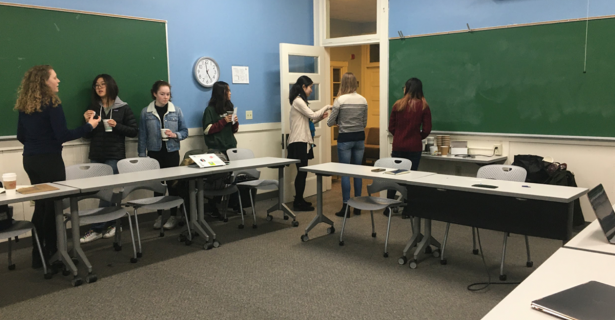On November 21, 2019, Tufts Women in International Relations hosted Caroline Armstrong Hall for our discussion on women in the field of International Relations and the role of International Law in protecting women’s rights.
Hall has extensive experience working on women’s rights issues and humanitarian issues. She has served as a legal intern for the United Nations Office of Legal Affairs where she researched interpretations of the UN Charter. She also has done work dealing with menstrual banishment in Nepal and on a possible treaty-in-the- making to ensure cross-border recognition of protection/restraining orders for the Hague Conference on Private International Law. Now as a student at The Fletcher School of Law and Diplomacy, Hall is specializing in international law and the political economy.
During the discussion, students went around the room explaining what interests them about the field of International Relations, specifically having to do with women’s rights. One topic the students were particularly interested in hearing about was the challenges Hall faced while working in the male-dominated field of IR. Hall offered helpful strategies to navigate workplace environments, stressing the necessity for clear communication with colleagues as well as making sure to respect all cultural norms when in a new setting.
In addition to the experience of women in a workplace culture, the group also discussed decision-making strategies, specifically surrounding Hall’s work in Nepal. We then talked about the intersection of International Law with protecting women’s rights, regarding the effect of the Convention on the Elimination of Discrimination Against Women. We conversed about how this impacted Hall’s work and humanitarian efforts in general on an international scale.
At the end of the discussion, we talked about why the field of International Relations in law is incredibly important and vice versa. Considering that law operates on a social context, it is always helpful to have a broader understanding of the population the law affects. Law can help those in international relations make more informed decision pertaining to policy.
Ultimately, the event was a success as students who attended had the unique opportunity of having a more intimate discussion revolving around Hall’s firsthand experience working as a woman in International Law. We look forward to hosting more events like these, helping students to shape what they want their future to look like.

